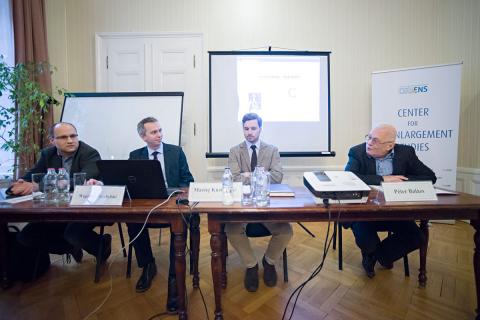Event Report - "Democracy Assistance from Central Europe: Goals, Ambitions, Tools"

Democracy assistance in the form of sharing ‘transition experience’ is a rising area of Visegrad countries’ international development cooperation policy. Nevertheless, many aspects of it are still unclear and require thorough debate among policy-makers and practitioners in the Czech Republic, Hungary, Poland and Slovakia. A panel discussion, entitled “Democracy Assistance from Central Europe: Goals, Ambitions, Tools” organized by the CEU Center for EU Enlargement Studies (CENS) on February 7, 2014, sought to contribute to this discussion.
The event hosted Wojciech Przybyłski, editor-in-chief of the Visegrad Insight magazine, Maciej Kuziemski, editor of Res Publica Nowa, and Balázs Szent-Iványi, lecturer of the Corvinus University Budapest, who discussed the new and emerging sphere of democracy assistance in Central Europe.
The event also served as the launch of the latest issue of the Visegrad Insight, a bi-annual magazine supported by the International Visegrad Fund, which provides forum for reflection on current, as well as historically relevant issues concerning all Visegrad countries (the Czech Republic, Hungary, Poland and Slovakia) and often Europe as a whole. As Wojciech Przybyłski pointed out, the goal of the Visegrad Insight magazine is to bring about debates that are so-far missing in the Visegrad countries on burning questions like – in this issue – solidarity within and among states.
The topic of democracy assistance falls in this line, as well. In the recent years, we have observed that a growing amount of money is invested in this area as a part of the international development cooperation of the Visegrad countries. However, a debate is much needed on how these countries can foster and support democratization worldwide in the most effective way, helping transition countries avoid the mistakes they had made, pointed out Przybyłski.
At the same time, there is a lack of consensus on what democracy assistance really means, said Maciej Kuziemski, who himself identifies it to be “a politically rationalized promotion of certain values we consider democratic,” which therefore varies from country to country. He warned against using the term ‘democracy promotion’ per se though, emphasizing that democracy cannot be imposed on societies, its development can only be assisted if there is a genuine need and demand for such assistance.
Kuziemski also noted that democracy assistance is only a tiny part of development aid, but a part that is crucial for the Visegrad countries: “we cannot think of development aid without it.” This is considered to be an added value Visegrad countries seek to bring to the international practice of development cooperation in the form of sharing their so-called ‘transition experience,’ pointed out Balázs Szent-Iványi. While it is debatable whether this transition experience is indeed transferable from one country or region to the other, the Visegrad countries claim that by sharing their knowledge on democratization and introduction of market economy they could enrich the development cooperation policy of such major actors as the European Union.
Summarizing his research, conducted with Simon Lightfoot, Szent-Iványi argued that on the level of rhetoric the European Union is indeed keen on incorporating the transition experience and thus assisting democratization in neighboring regions. Nevertheless, when it comes to practice, we hardly find any EU-supported projects in the recent years which were led by Visegrad countries in order to share their transition knowledge with interested partners. This disparity is yet to be addressed.
The introductory speeches were followed by a lively ‘question and answer’ session, which raised many important points, such as the need for the identification of strengths and weaknesses, which might differ from country to country, as a prerequisite of effective democracy assistance, as well as the consideration of demands of the target countries in order to address real needs. While these concerns seem to target basic considerations, practice proves that they are indeed valid observations often disregarded.
